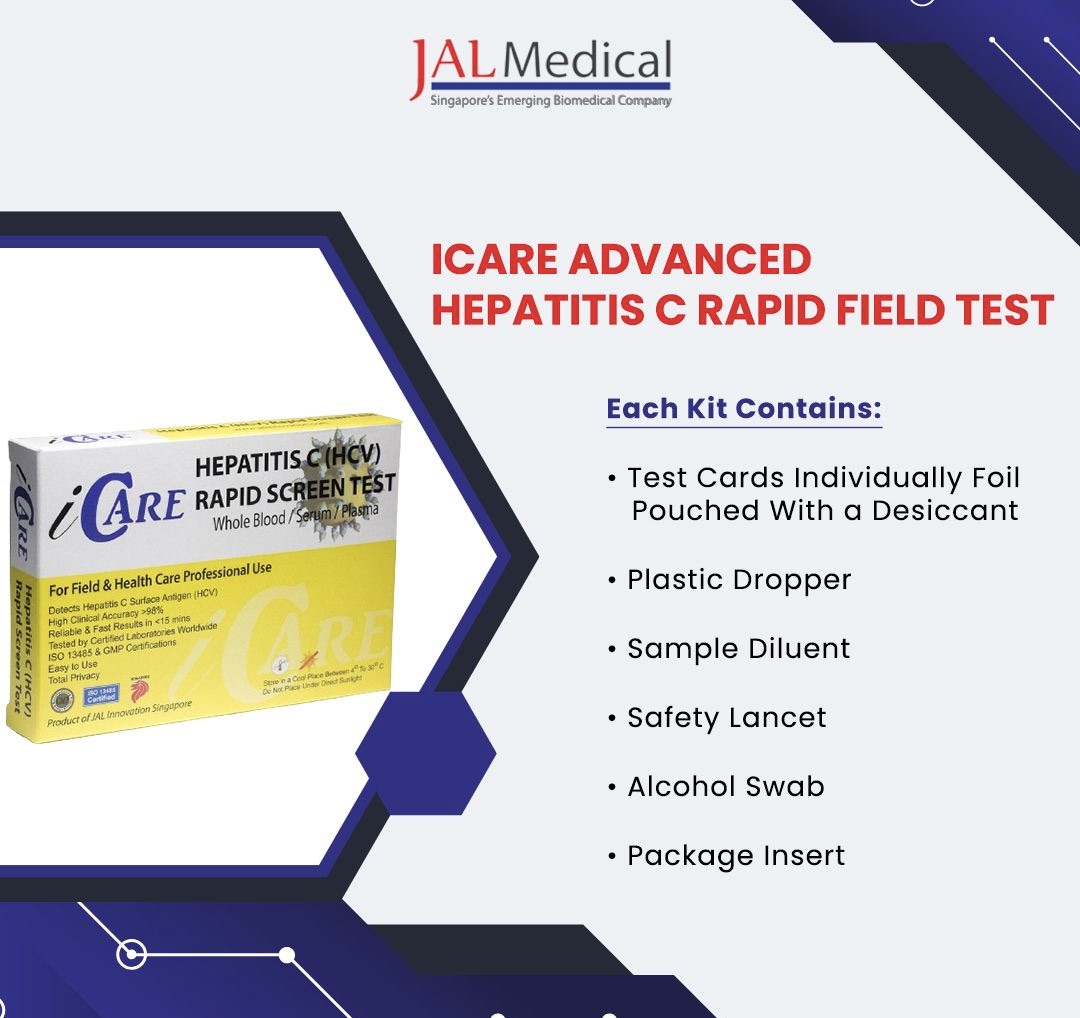Table of Contents
Hepatitis is a significant public health issue in Afghanistan, where the burden of Hepatitis B (HBV) and Hepatitis C (HCV) is rising. The country faces numerous healthcare challenges due to political instability, ongoing conflict and limited access to healthcare infrastructure, especially in rural areas. Cities like Kabul, Herat, Mazar-i-Sharif, Kandahar and Jalalabad have growing populations, yet they still face severe healthcare disparities when it comes to testing and diagnosing viral infections such as hepatitis.
Hepatitis B and C test are both viral infections that primarily spread through blood-to-blood contact. Common transmission methods include unsafe injections, contaminated blood transfusions and poor sanitation during medical procedures. In rural Afghanistan, many individuals remain unaware of their hepatitis status until the infection has caused significant damage. Hepatitis B and C can lead to liver cirrhosis, liver cancer and even death if left untreated.
Given the lack of healthcare resources in many rural areas, hepatitis rapid testing tools, such as the HCV rapid test kit, offer a practical solution for early diagnosis. This article will explore how primary healthcare workers (PHWs) are playing a pivotal role in increasing hepatitis testing coverage across Afghanistan’s major cities and rural regions, particularly focusing on areas like Kabul, Herat, Kandahar, Jalalabad and Mazar-i-Sharif.
The Importance of Hepatitis Testing in Afghanistan
Understanding the Hepatitis Burden in Afghanistan

Afghanistan has a large population at risk for Hepatitis B and C, with both viruses being among the leading causes of chronic liver disease in the country. These rates are especially concerning in cities like Kabul, where healthcare access is limited for lower-income groups and in rural provinces like Herat and Kandahar, where people may not have access to basic health services.
Hepatitis B and C often go undiagnosed because many people show no symptoms during the early stages of infection. Without proper screening and early treatment, the risks of liver failure and liver cancer increase significantly. With Afghanistan’s healthcare infrastructure severely strained due to decades of conflict, introducing more accessible testing methods such as Hepatitis rapid test kits is essential.
Challenges to Hepatitis Testing in Afghanistan
While the need for hepatitis testing is urgent, several barriers exist that prevent large segments of the population from getting tested, especially in rural areas like Mazar-i-Sharif and Jalalabad:
- Limited Healthcare Access: Many rural areas of Afghanistan, including Kandahar and Herat, have limited or no access to healthcare facilities capable of diagnosing hepatitis. This is especially true in areas where healthcare professionals are in short supply and diagnostic tools are scarce.
- Cultural Stigma and Awareness: In conservative communities, including those in Mazar-i-Sharif and Jalalabad, there is a strong stigma associated with hepatitis. People may fear discrimination or gossip, which may prevent them from seeking help or getting tested.
- Cost and Availability of Tests: In places like Herat or Kandahar, the cost of Hepatitis testing can be prohibitive. Affordable and accessible anti-HCV rapid tests can overcome this challenge by providing quick results without needing expensive equipment or trained laboratory personnel.

Primary Healthcare Workers: A Key Resource in Expanding Testing Coverage
The Role of Primary Healthcare Workers in Rural Afghanistan
Primary healthcare workers (PHWs) are often the first point of contact for patients seeking medical care in Afghanistan, particularly in rural and underserved areas like Kandahar and Mazar-i-Sharif. These healthcare workers, which include community health workers, nurses and family doctors, are ideally placed to promote hepatitis testing. Their frequent interaction with local communities makes them invaluable for raising awareness about the importance of early hepatitis testing and providing necessary services.
PHWs are often tasked with carrying out essential services, such as vaccination, maternal health and general check-ups. Integrating rapid hepatitis tests, such as the HCV rapid test kit or Hepatitis B Blood Tests, into their regular practices could significantly increase testing coverage. For example, PHWs in Jalalabad and Herat could administer these tests during routine visits to households, improving early detection rates without requiring patients to travel to distant health facilities.
Training Primary Healthcare Workers for Hepatitis Testing
For PHWs to effectively expand hepatitis testing, they need proper training in the use of Hepatitis rapid test kits. These kits, which include the HBsAg rapid test, are easy to use and provide quick results. Training PHWs to conduct these tests and interpret the results ensures that hepatitis diagnosis becomes a routine part of healthcare in Afghanistan, particularly in remote provinces like Kandahar and Jalalabad, where specialized diagnostic services are scarce.
Benefits of Hepatitis Rapid Testing
- Efficiency and Speed: The rapid hepatitis tests, provide results in as little as 15 minutes, which is a huge advantage for PHWs in busy clinics and outreach programs. This quick turnaround time allows for immediate follow-up with treatment or further testing if needed.
- Portability: HCV Test Kits are small, portable and easy to transport, making them ideal for outreach programs in rural Afghanistan. PHWs can carry these kits on mobile health units that travel to remote villages in Mazar-i-Sharif, Kandahar or Herat.
- Affordability: The low cost of rapid tests means that PHWs can perform these tests as part of routine check-ups without incurring significant costs. This makes hepatitis testing more accessible to underserved populations, particularly in provinces like Jalalabad, where healthcare services may be limited.
- Community Trust: PHWs are trusted members of their communities and their involvement in healthcare programs increases the likelihood that individuals will seek testing. By training PHWs to administer Hepatitis C home test kits, the healthcare system can increase the acceptance of testing and reduce stigma in communities like Herat and Mazar-i-Sharif.
Increasing Access to Hepatitis Testing in Afghanistan
Expanding Access through Mobile Health Units and Outreach
To increase testing coverage, mobile health units, led by trained PHWs, can travel to rural and underserved areas of Afghanistan, such as Kandahar and Jalalabad, where the nearest healthcare facility may be hours away. These mobile units can distribute HCV rapid test kits, as well as educate people about the risks of hepatitis and the importance of early diagnosis.
Furthermore, outreach programs can be conducted in villages and communities where healthcare is not easily accessible. These outreach programs can:
- Offer Free Testing: Providing free hepatitis testing to high-risk populations, such as individuals who have received blood transfusions or intravenous drug users, can help increase awareness and encourage people to seek out care.
- Distribute Educational Materials: Educational initiatives can be aimed at communities in Herat and Mazar-i-Sharif, helping people understand the symptoms of hepatitis, how it is transmitted and the importance of early diagnosis.
- Raise Awareness through Local Leaders: Working with local leaders in Kabul, Kandahar and Jalalabad to promote hepatitis testing can help reduce the stigma associated with the disease and encourage more people to get tested.

Improving Healthcare Infrastructure
While PHWs are essential to the success of hepatitis testing initiatives, improvements in Afghanistan’s healthcare infrastructure are also necessary. More testing centers, well-equipped laboratories and accessible healthcare services must be established in rural regions like Kandahar and Jalalabad to provide further support for rapid hepatitis testing.
Conclusion
Leveraging primary healthcare workers to expand hepatitis testing coverage is an essential step toward tackling the hepatitis crisis in Afghanistan. By integrating rapid hepatitis test kits into PHWs’ daily practices, especially in cities like Kabul, Herat and Mazar-i-Sharif, the country can achieve significant improvements in early detection and treatment of Hepatitis B and Hepatitis C.
Training PHWs in the use of Hepatitis B Blood Tests, will not only improve testing coverage but also help reduce the stigma surrounding hepatitis. This will ensure that the Afghan population receives the healthcare they need, particularly in rural areas where access to healthcare services remains a challenge.
FAQS ON Hepatitis Testing
Expanding Hepatitis Testing in Afghanistan: Leveraging Primary Healthcare
How accurate is the hepatitis rapid test?
The accuracy of hepatitis rapid tests depends on the brand, but many rapid tests offer high sensitivity and specificity comparable to laboratory-based tests. A positive result should be followed by confirmatory testing in a healthcare facility.
Can primary healthcare workers administer hepatitis tests in Afghanistan?
Yes, primary healthcare workers in Afghanistan can be trained to perform HCV rapid tests, HBsAg tests and other hepatitis tests. These tests are easy to use and PHWs are well-positioned to increase access to testing in rural areas.
How can mobile health units help expand hepatitis testing in Afghanistan?
Mobile health units can travel to remote regions such as Kandahar and Herat, offering hepatitis C test kits and HCV rapid tests to communities that lack access to healthcare facilities.
What are the benefits of rapid hepatitis tests for primary healthcare workers?
Rapid hepatitis tests provide quick results, are portable and are affordable, making them ideal for PHWs working in rural areas. They help improve early diagnosis and facilitate timely follow-up care.
Why is hepatitis testing important in Afghanistan?
Hepatitis B and C are widespread in Afghanistan and early detection is crucial to prevent severe liver disease. Rapid hepatitis tests increase access to testing, enabling early diagnosis and treatment.






